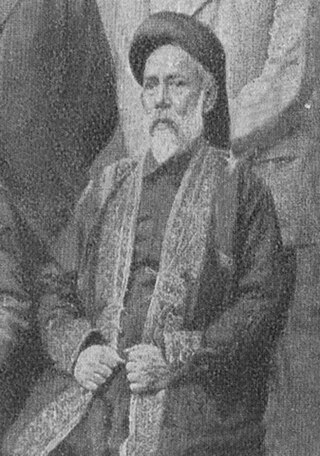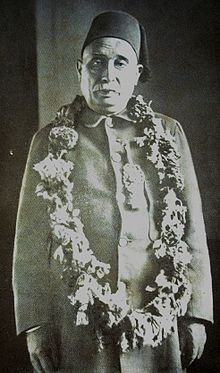Abdul Hakim was a Bengali poet and translator who wrote several Bengali epics and also translated some Persian manuscripts.

Dhaka (Dacca) is a modern megacity with origins dating to circa the 7th century CE. The history of Dhaka begins with the existence of urbanised settlements that were ruled by the Hindu Gauda Kingdom, Buddhist and Shaivite Pala Empire before passing to the control of the Hindu Sena dynasty in the 10th century CE. After the Sena dynasty, the city was ruled by the Hindu Deva Dynasty.

Hakim Habibur Rahman was an Unani physician, litterateur, journalist, politician and chronicler in early 20th-century Dhaka.
The name Kayqubad may refer to the following people
Dewan Mohammad Azraf was a Bengali philosopher, teacher, author, politician, journalist and activist. In 1993, he was honoured as a National Professor in Bangladesh. He was also a supporter of the Bengali Language Movement. For his support of the movement, he was dismissed from the post of the principal of Sunamganj College in 1954, the same year he was promoted to the post. His support was particularly influential when he edited the Nao Belal in 1948. He was actively involved with Kaikobad Sahitya Majlish (1972–99).

Ubaidullah Al Ubaidi Suhrawardy was a Bengali Islamic scholar, educationist and writer from Midnapore. He is often regarded as the Father of modern Islamic education in Bengal.

Mohammad Mozammel Huq was a Bengali-language poet, novelist, magistrate and educationist. His writings were said to have been inspired by a "Muslim renaissance".
Dawlat Wazir Bahram Khan, born as Asaduddin, was a 16th-century medieval Bengali poet and the Wazir of Chittagong in southeastern Bengal.
Abū al-Khayr Muḥammad Ayyūb ʿAlī al-Māturīdī, or simply Ayub Ali, was a Bangladeshi Islamic scholar, author and educationist. He was awarded the Ekushey Padak in 1976 by the Government of Bangladesh.
Ataur Rahman (1925–1999) was a Bangladeshi poet. He was awarded Bangla Academy Literary Award in 1970.
Maulawi Āghā Aḥmad ʿAlī was a 19th-century Bengali academic, historian and scholar of the Persian language. In addition to Persian, he also composed poetry in Urdu. He is seen as one of the greatest Persian scholars of Dhaka, and even Bengal as a whole.
Mohammad Raushan Yazdani was a Bengali author and researcher of folk literature. As a folklorist, his work was crucial due to his discoveries of tales and poems from the remotest villages of eastern Bengal. His most celebrated work is Momenshahir Loka-Sahitya dedicated to folk literature in Momenshahi (Mymensingh) Yazdani was one of the most popular Bengali poets in the Pakistan period.
Afzal Ali was a medieval Bengali poet. He is best known for his magnum opus, Nasihatnama. Abdul Karim Sahitya Bisharad claims that he belongs to the 16th-century, although Banglapedia places him in the 17th century.
Sylhet Government Alia Madrasa is located in Chawhatta, Sylhet, Bangladesh. Founded in 1913, the madrasa currently has more than 650 students and 18 staff. The institution is located on the opposite side of Sylhet Government Women's College. It consists of 3 buildings, a dorm, a playground and 11,000-book-filled library.
Majd ad-Dīn al-Madanī, also known as Madan Shāhjahānpūrī, was an 18th-century Indian Muslim theologian. He served as the first principal of the Calcutta Madrasa, the first Alia Madrasa of Bengal.

Nūr Qut̤b ʿĀlam was a 14th-century Bengali Islamic scholar, author and poet. Based in the erstwhile Bengali capital Hazrat Pandua, he was the son and successor of Alaul Haq, a senior scholar of the Bengal Sultanate. He is noted for his efforts in preserving the Muslim rule of Bengal against Raja Ganesha and pioneering the Dobhashi tradition of Bengali literature.

Abū az-Zibriqān ʿAbd ar-Raḥmān ibn ʿAbd al-Hādī Dāmullā al-Kāshgharī an-Nadwī, or simply Abdur Rahman Kashgari, was one of the leading scholars of the Arabic language and literature in the Indian subcontinent. Of Uyghur background, Kashgari migrated from East Turkestan to India at an early age, completing his studies in Lucknow where he became an accomplished Islamic scholar, linguist, poet and author. He then migrated to Bengal, where he eventually became the principal of Dhaka Alia Madrasa. Kashgari was also the first khatib of the Baitul Mukarram National Mosque, holding this role until his death.

Nawab Sirajul Islam was a Bengali lawyer, activist and educational reformer.

Nesaruddin Ahmad was a Bengali Islamic scholar, spiritual reformer, educationist and writer. He was the main disciple of Furfura Sharif's Mohammad Abu Bakr Siddique in eastern Bengal. Ahmad was the inaugural Pir of Sarsina, having founded the Sarsina Darbar Sharif and Darussunnat Kamil Madrasa in 1915, one of the largest Islamic institutions in South Bengal and the first major alia madrasah after Calcutta. Ahmad was among the leading Islamic leaders in colonial Barisal, and his influence extended across Bengal. The Nesarabad Upazila of Bangladesh has been named after him.

Abū Naṣr Muḥammad Waḥīd, or simply Abu Nasr Waheed, was a Bangladeshi Islamic scholar, educationist, author and politician. He is best known for his reformations to Islamic education in Bengal, and development of Arabic language education among Bengali Muslims. Wahid also served as the Education Minister of British Assam and a member of the Assam Legislative Assembly.









